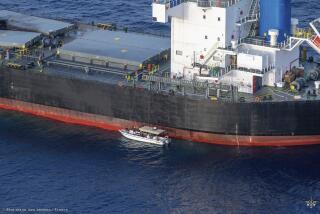U.S. Blocks Rocket Fuel Shipment to Probe Iran Link
- Share via
WASHINGTON — The State Department said Friday that it has suspended an export license for a large batch of rocket fuel ingredient until investigators can determine whether the shipment would be likely to end up in Iran, a prohibited user.
The action followed reports that 286,000 pounds of ammonium perchlorate, enough for fuel to propel about 300 missiles, was being loaded aboard a ship bound for Iran last year when Dutch police seized it at the request of the U.S. Customs Service.
President Bush’s national security adviser, Brent Scowcroft, was believed to have initiated the license suspension after Rep. Les Aspin (D-Wis.), chairman of the House Armed Services Committee, and Rep. Robert A. Roe (D-N.J.), chairman of the House Science, Space and Technology Committee, urged him to intervene.
The lawmakers expressed fears that a federal judge in Houston would release the impounded chemical to its owner, Girindus Corp. of Tampa, Fla., as early as Monday. U.S. Dist. Judge Sim Lake ruled two weeks ago that the seizure in the Dutch port of Rotterdam was illegal.
The Customs Service is fighting that ruling and demanding that the shipment be forfeited to the government on grounds that the bill of lading bore a false destination of Basel, Switzerland.
Intended for Swiss
A Girindus attorney said Friday night that the firm intended that the chemical be delivered to a Swiss firm. She insisted that Girindus has no knowledge of how the chemical came to be transferred from an American freighter to the Iranian vessel after arriving in Rotterdam from Houston.
The attorney, who requested that she not be identified by name, said that an export license was issued for the shipment last November, even after it had been seized nine months earlier. The license stated that the chemical, if released, would be delivered to three firms in England, West Germany and the Netherlands that have military contracts with the North Atlantic Treaty Organization.
“If they turn around and give it to someone else--I don’t know how you can control that,” the Girindus attorney said.
A State Department spokesman said that investigators would seek to verify that the ammonium perchlorate would wind up in the hands of the NATO-related firms rather than Iran’s.
Customs Commissioner William von Raab has said that he believes there will be attempts to send the chemical to Iran if the impounded shipment is released.
In a related development, James C. Fletcher, head of the National Aeronautics and Space Administration, said he still has not approved a $92-million, federally financed loan for a Nevada firm that manufactured the chemical in the disputed shipment.
In an interview, he said that National Security Council aides had cleared the firm of a connection to the apparent attempt to export the chemical to Iran. However, other unspecified issues are blocking approval of the loan to the Pacific Engineering & Production Co. of Henderson, Nev., he added.
The loan is needed to rebuild a plant destroyed in an explosion last May that severely cut the nation’s supply of rocket fuel oxidizer for space boosters and missiles.
Rep. Roe, disagreeing that the Nevada firm had been cleared, said that his committee plans hearings on the matter next week. An aide said that investigators already have dug up evidence raising new questions about the company’s connections with a West German firm suspected of being involved in exports to Iran.
The aide, who asked not to be identified by name, said that an official of the Nevada firm had said that a manager with crucial knowledge of a possible connection had died in the explosion.
The aide also said that State Department officials, in an interagency meeting convened by Roe on Friday, admitted to a number of foul-ups in granting the export license to Girindus.
The aide said the officials acknowledged that Girindus was improperly told in January, 1988, that it did not need an export license, even though ammonium perchlorate is on a list of weapons-related items requiring such a document.
The aide said the State Department officials also acknowledged that, in granting Girindus a license last November, they did not consult with the Defense and Commerce departments, which were carefully allocating the scarce chemical to satisfy U.S. needs in the wake of the Nevada plant explosion.
“They (State Department officials) were frank in saying they were sorry about all of this,” the aide said. The officials could not be reached for comment.
More to Read
Sign up for Essential California
The most important California stories and recommendations in your inbox every morning.
You may occasionally receive promotional content from the Los Angeles Times.













